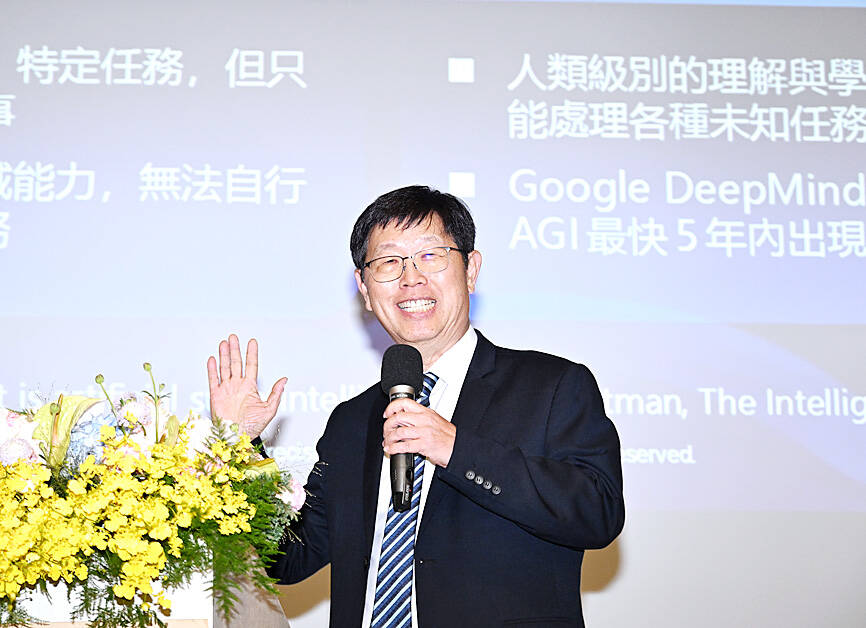Taiwan is an important base for the global development of artificial intelligence (AI) computing and technologies, Hon Hai Precision Industry Co (鴻海精密) chairman Young Liu (劉揚偉) said yesterday at an event organized by the Chinese National Federation of Industries (全國工業總會) in Taipei.
Taiwanese contract manufacturers accounted for 90 percent of the global AI server market, whereas Hon Hai, also known as Foxconn Technology Group (富士康科技集團), supplied at least 40 percent of the market to meet global demand for AI computing, Liu said.
Hon Hai’s AI product lineups cover graphics processing units, servers, and full system assembly and liquid-cooling solutions, he said.

Photo: Fang Pin-chao, Taipei Times
“One of the biggest advantages of Taiwan’s technology industry is its comprehensive supply chain, in which manufacturers can reach one another within one-and-a-half hours,” he said. “Other countries might have similar supply chains, but their factories are scattered across much larger regions than Taiwan.”
The US$500 billion Stargate Project, backed by OpenAI, Softbank Group Corp and Oracle Corp to build AI infrastructure in the US by 2029, coupled with other AI investments by global tech giants, presents a significant opportunity for Taiwan, Liu said, adding that he is confident in Taiwan’s prowess in AI sector.
Hon Hai’s development plans for the AI sector is comprised of four aspects: vertical integration of hardware and software, building AI data center industry chains, applying AI systems to corporate governance, and building generative-AI platforms for manufacturing, vehicles and cities, Liu said.
“We have discussed with many countries the issue of building AI data centers and related supply chains, and have talked with Minister of Economic Affairs J.W. Kuo (郭智輝) about helping our Taiwanese peers expand their businesses in these countries,” he said.
Hon Hai is also striving to develop smart manufacturing, smart electric vehicles (EVs) and smart cities based on generative AI technologies, following the company’s announcement last year that it would team up with Nvidia Corp to build an advanced computing center in Kaohsiung to support the initiatives, he said.
For the smart EV sector, the company plans to use over-the-air programming, generative AI-based engines and humanoid AI autonomous systems for vehicles, Liu said.
Analysts generally do not have a positive outlook for autonomous vehicle systems, as past development heavily relied on training using vast amounts of images, often leading to misjudgements in unfamiliar scenarios and resulting in accidents, he said.
“Now that generative AI systems are being applied to vehicles, they can intelligently identify each situation, so we believe humanoid AI autonomous systems should be adopted in the EV industry,” he added.
Talking to reporters after the event, Liu said that US President Donald Trump’s tariff policy would affect global trade, which in turn would also impact the company’s global operations.
As Hon Hai had planned its global deployment early, the effect would be relatively limited, he said.
Nevertheless, Liu said he supports the free flow of goods, adding that the best scenario would be an “open” one.

SEEKING CLARITY: Washington should not adopt measures that create uncertainties for ‘existing semiconductor investments,’ TSMC said referring to its US$165 billion in the US Taiwan Semiconductor Manufacturing Co (TSMC, 台積電) told the US that any future tariffs on Taiwanese semiconductors could reduce demand for chips and derail its pledge to increase its investment in Arizona. “New import restrictions could jeopardize current US leadership in the competitive technology industry and create uncertainties for many committed semiconductor capital projects in the US, including TSMC Arizona’s significant investment plan in Phoenix,” the chipmaker wrote in a letter to the US Department of Commerce. TSMC issued the warning in response to a solicitation for comments by the department on a possible tariff on semiconductor imports by US President Donald Trump’s

The government has launched a three-pronged strategy to attract local and international talent, aiming to position Taiwan as a new global hub following Nvidia Corp’s announcement that it has chosen Taipei as the site of its Taiwan headquarters. Nvidia cofounder and CEO Jensen Huang (黃仁勳) on Monday last week announced during his keynote speech at the Computex trade show in Taipei that the Nvidia Constellation, the company’s planned Taiwan headquarters, would be located in the Beitou-Shilin Technology Park (北投士林科技園區) in Taipei. Huang’s decision to establish a base in Taiwan is “primarily due to Taiwan’s talent pool and its strength in the semiconductor

An earnings report from semiconductor giant and artificial intelligence (AI) bellwether Nvidia Corp takes center stage for Wall Street this week, as stocks hit a speed bump of worries over US federal deficits driving up Treasury yields. US equities pulled back last week after a torrid rally, as investors turned their attention to tax and spending legislation poised to swell the US government’s US$36 trillion in debt. Long-dated US Treasury yields rose amid the fiscal worries, with the 30-year yield topping 5 percent and hitting its highest level since late 2023. Stocks were dealt another blow on Friday when US President Donald

UNCERTAINTY: Investors remain worried that trade negotiations with Washington could go poorly, given Trump’s inconsistency on tariffs in his second term, experts said The consumer confidence index this month fell for a ninth consecutive month to its lowest level in 13 months, as global trade uncertainties and tariff risks cloud Taiwan’s economic outlook, a survey released yesterday by National Central University found. The biggest decline came from the timing for stock investments, which plunged 11.82 points to 26.82, underscoring bleak investor confidence, it said. “Although the TAIEX reclaimed the 21,000-point mark after the US and China agreed to bury the hatchet for 90 days, investors remain worried that the situation would turn sour later,” said Dachrahn Wu (吳大任), director of the university’s Research Center for